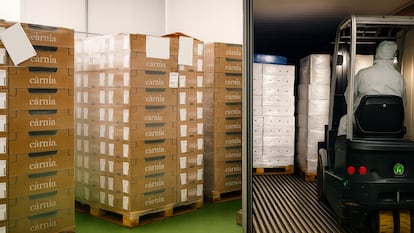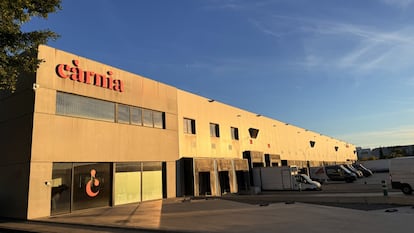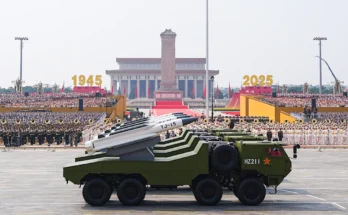The history of Companyia General Càrnia is the map of many Spanish industrial SMEs that have been able to transform a family vocation into a competitive structure. Oriol Matias Turró, partner and financial director of the company, explains that its origins date back to the 1920s, “to the market stalls of La Boqueria and Ninot in Barcelona, founded by our families. With an entrepreneurial spirit that, generation after generation, has maintained its character and its commitment to local products and quality.”
The brand as it is known today was founded and born in 1999, when CarnSalas and Carnes Tonjuan joined forces to create a joint project capable of tackling the modernization of the sector. Since then, the brand has accumulated milestones such as concentrating operations in Mercabarna, where the group’s land exceeds 20,000 square meters and production facilities amount to more than 14,000 square meters; the adoption of international standards – IFS and Welfair –; and the integration, in 2022, of Osvaca, which incorporated the ownership of the Sabadell slaughterhouse into the group and strengthened vertical integration.
- Name: Companyia General Carnia
- Year of foundation: 1999
- Product or service you market: production, processing and distribution of fresh and frozen beef, sheep, pork and other families
- Position: Mercabarna (Barcelona)
- Billing: 106.9 million euros in 2024 (298 million for Grup Càrnia)
- Forecast 2025: exceed 110 million euros individually and 300 million as a group
- Exported product: fresh and frozen meat, certified according to IFS standards, Welfair and Halal seal
- Markets to which it exports: Portugal, France, Italy, Greece, Qatar, Cuba and Algeria
- Main export partners: Banco Sabadell, for the financial management and insurance of international collections, especially in the Cuban market
- Your biggest challenge: overcome regulatory and logistical barriers in non-EU markets while maintaining product excellence and safety in international operations
- Future goal: reach 30% of export volume in the medium term and continue to consolidate the integration of Grup Càrnia as an international point of reference
- A tip: Internationalization requires long-term vision, rigor and trusted partners; Only with solid foundations and a constant commitment to quality is it possible to grow sustainably in global markets.
“It is a project that has managed to become professional,” says Matias, who highlights investments in machinery and traceability and control technologies as the basis for guaranteeing the quality of its processes at every stage, from exploitation to distribution. And as a decisive factor for the company to reach a turnover of 106.9 million euros in 2024. As a group, this figure has exceeded 298 million and the forecast, according to the manager himself, is to greatly exceed them in 2025.
Not in vain, and beyond the investments mentioned above, over the last decade the company has strengthened its commitment to people and innovation. Matias underlines that professionalization does not only involve machines, but requires qualified teams and the digitalization of processes so that traceability is rapid and verifiable. In this sense, the company has introduced tools and control systems that shorten administrative times, improve production planning and speed up international shipments, key factors when it comes to goods that transit through different customs offices and time zones.
In recent years, in fact, Companyia General Càrnia has also strengthened its commitment to sustainability and innovation, two axes which, according to Matias, mark the company’s new growth cycle. The commitment to improving processes, reducing waste and ensuring animal welfare has become a central element of its business. “The expansion of the structures and the obtaining of international certifications such as IFS or Welfair were fundamental steps to consolidate our position on the market”, explains the manager.
Strategy, markets and logistics
As for internationalization, this large company has arrived gradually, introducing fresh and processed products suitable for local customers in neighboring countries -Portugal and France-. “That experience gave us a solid export base and encouraged us to continue growing,” explains Matias. The decisive step was the opening to non-EU markets, facilitated by certifications such as Halal and food safety standards.
Today the company regularly exports to destinations in the European Union (such as Portugal, France, Italy and Greece) and maintains routes to countries in North Africa and the Middle East, including Qatar. Likewise, in recent years it has developed a stable commercial line with Cuba, “where sales already exceed two and a half million euros per year”, according to the manager. Exports therefore represent approximately 15% of the company’s turnover overall, with the ambition of reaching 30% in the medium term; At group level, the international weight varies between 40% and 50%.
To achieve this, the company has applied a strategy based on proximity and stability, prioritizing markets with clear regulatory frameworks and long-lasting relationships with local distributors. “The commitment was firm, but planned, prioritizing strong and sustainable relationships with each customer,” says Matias. Therefore, its business model is supported by local distributors specializing in wholesale channels, see in detail and Horeca -“carefully selected”-, and in the logistics centralization of Mercabarna.
In the manager’s words: “We centralize export management and shipment planning from our facilities. This allows us to maintain traceability and control from the origin and respond quickly to each customer’s needs.” For strategic markets, the group collaborates with exclusive distributors who act as representatives and amplify the presence in the point of sale.
In this sense, the aforementioned Halal certification was an indispensable element for opening up to the countries of the Maghreb and the Persian Gulf. So much so that the company claims to have “production lines specifically suited to these requirements, guaranteeing total traceability and absolute compliance with Halal practices”. Together with the above, the IFS and Welfair certifications strengthen credibility in the European markets and constitute, for Matias, the pillar that allows it to offer the highest health and process guarantees in destinations with different standards, key to consolidating Càrnia’s international presence.

Barriers, supports and international roadmap
However, the export challenge has not been easy. On the one hand, at an operational level, among the main obstacles the company has encountered in accessing operations in other countries are the fluctuation of transportation costs and differences in consumer habits. On the other hand there are administrative and health factors; in particular, approvals, customs procedures and other specific requirements which, in some cases, prolong market opening processes.
The most illustrative example of the above is the arrival of the brand in Cuba, since the commercial opening in the Caribbean country involved a bureaucratic process that lasted more than a year. In this scenario, financial and operational support was decisive. “The collaboration with Banco Sabadell was fundamental”, explains Matias, “both to facilitate access procedures and to give security to operations through specific financial products for that market”.
Furthermore, at a production level, the company has strengthened its capacity through investments in high precision freezing (IQF) technology and in machinery that preserves the organoleptic and sanitary qualities of the product, factors that facilitate entry into distant and demanding markets. Vertical integration – from food and animal welfare, to distribution, through slaughter and production – provides another competitive advantage: “We control the entire value chain and this allows us to offer complete traceability and constant quality”, underlines the Càrnia manager.
In terms of growth objectives, Companyia General Càrnia’s road map for the next few years aims to combine both consolidation and opening up to new destinations. Matias specifies that the company intends to consolidate its presence in the European markets mentioned above as well as in Cuba, while contemplating entry into some East Asian countries, citing Japan and South Korea as destinations of interest. The strategic objective is to increase the share of exports to 30% of turnover in the coming years and continue to strengthen synergies within the group structure. “The financial solidity of the group allows us to face this growth with guarantees, always betting on a sustainable, efficient model with a long-term vision,” concludes Matias.




